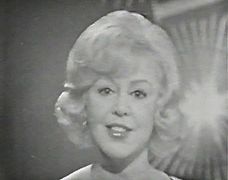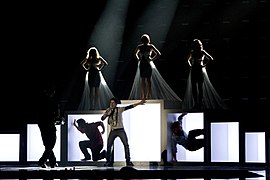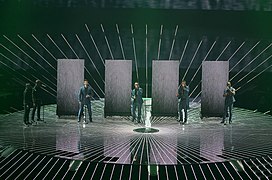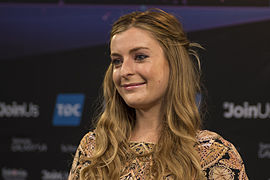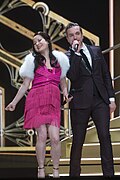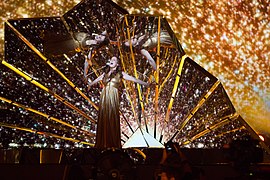United Kingdom at the Eurovision Song Contest
- Broadcasting company

- First participation
- 1957
- Number of participations
- 62 (as of 2019)
- Highest ranking
- 1 ( 1967 , 1969 , 1976 , 1981 , 1997 )
- Highest Score
- 227 (1997)
- Lowest Score
- 0 ( 2003 )
- Points average (since first post)
- 65.77 (as of 2019)
- Average points per voting country in the 12-point system
- 2.71 (as of 2019)
This article looks at the history of the United Kingdom of Great Britain and Northern Ireland as a participant in the Eurovision Song Contest .
Regularity of participation and successes in competition
Great Britain first took part in 1957. However, the debut was not very successful. Patricia Bredin only landed 7th out of 10. After this failure, the country suspended in 1958, but returned in 1959. In 1959, the country was also significantly more successful than when it debuted. Finally, the duo Pearl Carr & Teddy Johnson reached second place. Also in 1960 and 1961, the British contributions landed in each case in second place, making Great Britain the first country in the competition to reach second place three times in a row. Participations in 1962 and 1963 were just as successful, however, as the British entries each reached fourth place. In 1964 and 1965, Great Britain again achieved second place in the competition and thus achieved its fifth second place. The placement in 1966 was all the more disappointing. The singer Kenneth McKellar only landed 9th out of 18 and thus only in the midfield, which was Britain's worst placement since her debut. The country was all the more successful in 1967 when Sandie Shaw won the entire competition with the song Puppet on a String . In 1967 the competition took place for the third time in the United Kingdom, after the country had hosted it in 1960 and 1963. The country almost won again, but in the end Spain ended up one point ahead of Great Britain. Thus in 1968 the country achieved its sixth second place. In 1969 Great Britain won the competition again. After all, the British singer Lulu was one of four winners with her song Boom Bang-a-Bang , alongside the participants from France, Spain and the Netherlands. In 1970, the British contribution came in second again. In 1971, on the other hand, with fourth place, for the first time since 1966, no placement among the top two was achieved. In 1972, however, that was over again, as Great Britain again reached number 2. In 1973, Cliff Richard represented the country again, having finished second in 1968. This time, however, it reached number 3, which is the first time that Great Britain achieved this position. In 1974 the country reached number 4, as in 1971. In 1975 the band The Shadows again reached number 2 for the country. It was the ninth time that the country had achieved this ranking. In 1976 Great Britain could then get its third victory in the competition after the band Brotherhood of Man won the competition for themselves. With 164 points, they also achieved a new high for the country. In 1977, when the competition was held in London, the British entry again took second place. It wasn't until 1978 that Britain's streak of top five finishes ended.
In 1978, the British contribution achieved 11th out of 20, the worst ranking for over ten years. In 1979, Great Britain was only able to land in the upper middle field with place 7 out of 19. In 1980, however, the country was again among the top five. In 1980 the band Prima Donna reached 3rd place. In 1981 the country was even more successful, as the group Bucks Fizz won the competition. It was the fourth victory of the United Kingdom in the competition. From 1982, however, began Great Britain's weakest phase in the competition. In 1982, 1984 and 1986 Great Britain only reached 7th place in the competition, while 1983 came 6th place. In 1985, with fourth place, a placement in the top three was just missed. In 1987, the British contribution even only reached number 13 out of 22, which means that for the first time in recent years the country could not achieve a place in the top ten. In 1988 and 1989 the country was very successful again. In each of these years, the British contributions reached second place, with Switzerland only narrowly winning in 1988 because they had one point more than the United Kingdom. It was the twelfth time that the country reached second place. In 1990 the singer Emma achieved 6th place again, a good result for the country. Also in 1991 Great Britain placed in the top ten with 10th place. In 1992 and 1993 Great Britain reached 2nd place again. In 1994 and 1995 the British contributions reached 10th place each. In 1996 the country reached 3rd place in the preliminary round and was able to win in the Position the final in 8th place. In 1997 Great Britain was able to record its fifth victory in the competition. Eventually, the band Katrina and the Waves won the competition with 227 points, which is still the highest score in the competition for Great Britain to this day. In addition to this peculiarity, the country became part of the introduced “big ones” in 1997 - the Big Four (Germany, France, Great Britain, Spain), since 2011 the Big Five (with Italy), the largest EBU contributors - and thus always has a guaranteed final place. This measure was introduced to ensure the long-term participation of the large donors (Spain, Great Britain, France and Germany, from 2011 also Italy) and thus the survival of the contest. In 1998, when the competition took place for the eighth and final time in the United Kingdom, singer Imaani achieved the country's last second place in the competition to date. It was the fifteenth time that the country ranked 2nd. After these successful years, however, the UK's competition went steeply downhill and since then the UK has had its weakest phase in competition.
In 1999, Great Britain reached 12th place, the first place in the midfield since 1987. In the years 2000 and 2001, the British contributions also only achieved placements in the midfield with places 16 and 15. In 2002, the country was again successful in the competition, as Jessica Garlick place 3 reached. The ranking in 2003 was all the worse. There the singing duo Jemini reached the last place without having received a single point. To date, it is Britain’s worst result in the competition. After this fiasco, success could not return in 2004 either. So the country only reached 16th place. In 2005, the singer Javine landed third from the bottom. Also in 2006 Great Britain was not very successful in the competition and ended up in the lower midfield with 19th place. In 2007, the country landed second to last in the final, while Great Britain finished last for the second time in 2008. It was all the more successful in 2009 that the country ended up in 5th place. It was the best placement since 2002. The following year, however, the country was again last, bringing Great Britain to its third last place. In 2011, the band Blue then just missed a placement in the top ten with 11th place. In 2012 Engelbert Humperdinck then reached a penultimate place. Bonnie Tyler 2013 was also not very successful in the competition. After all, it ended up only in 19th place. In 2014, Great Britain was able to place itself in the midfield again with 17th place, while the country only ended up third from last in 2015 and 2016. In 2017, Lucie Jones achieved 15th place, the best ranking for Great Britain since 2011, while SuRie only came third from bottom in 2018. In 2019, the UK came last for the first time since 2010.
A total of 42 of the 62 entries ended up in the left half of the table. In addition, the country only came last four times. With five wins, 15 second places, which is a record in the competition, and three third places, the United Kingdom is one of the most successful countries in the competition, despite the rather moderate successes since 1999. With 62 participations it is one of the longest participating countries in the competition. In the end, the country only missed the first song contest in 1956 and voluntarily stopped in 1958.
List of posts
Color legend: - 1st place. - 2nd place. - 3rd place. - Equal points with last place. - Eliminated in the semifinals / in the qualification / in the Eastern European preliminary decision. - no participation / not qualified. - Cancellation of the Eurovision Song Contest.
| year | Interpreter | Title Music (M) and Text (T) |
language | translation | final | Semi-final / qualification |
National preliminary decision |
Charts (UK) |
||
|---|---|---|---|---|---|---|---|---|---|---|
| space | Points | space | Points | |||||||
| 1957 | Patricia Bredin |
All M: Reynell Wreford; T: Alan Stranks |
English | Everything | 7/10 | 6th | Direct participation | Festival of British Popular Songs 1957 | - | |
| 1958 | No participation | |||||||||
| 1959 | Pearl Carr & Teddy Johnson |
Sing Little Birdie M: Stan Butcher ; T: Syd Cordell |
English | Sing, little bird | 2/11 | 16 | Direct participation | Eurovision Song Contest British Final 1959 | 12 | |
| 1960 | Bryan Johnson |
Looking High, High, High M / T: John Watson |
English | Looking up, up, up | 2/13 | 25th | Eurovision Song Contest British Final 1960 | 20th | ||
| 1961 | The Allisons |
Are You Sure M / T: John Allison, Bob Allison |
English | Are you sure? | 2/16 | 24 | A Song for Europe 1961 | 2 | ||
| 1962 | Ronnie Carroll |
Ring-a-Ding Girl M: Syd Cordell; T: Stan Butcher |
English | Ring-a-ding girl | 4/16 | 10 | A Song for Europe 1962 | 46 | ||
| 1963 | Ronnie Carroll |
Say Wonderful Things M: Philip Green; T: Norman Newell |
English | Say wonderful things | 4/16 | 28 | A Song for Europe 1963 | 6th | ||
| 1964 | Matt Monro |
I Love the Little Things M / T: Tony Hatch |
English | I love the little things | 2/16 | 17th | A Song for Europe 1964 | 4th | ||
| 1965 | Kathy Kirby |
I Belong M: Peter Lee Sterling; T: Phil Peters |
English | I belong | 2/18 | 26th | A Song for Europe 1965 | 36 | ||
| 1966 | Kenneth McKellar |
A Man Without Love M: Cyril Ornadel; T: Peter Callander |
English | A man without love | 9/18 | 8th | A Song for Europe 1966 | 30th | ||
| 1967 | Sandie Shaw |
Puppet on a String M / T: Bill Martin, Phil Coulter |
English | Puppet | 1 /17 | 47 | A Song for Europe 1967 | 1 | ||
| 1968 | Cliff Richard |
Congratulations M / T: Bill Martin, Phil Coulter |
English | congratulation | 2/17 | 28 | A Song for Europe 1968 | 1 | ||
| 1969 1 | Lulu |
Boom Bang-a-Bang M: Alan Moorhouse; T: Peter Warne |
English | Boom bang-a-bang | 1 /16 | 18th | A Song for Europe 1969 | 2 | ||
| 1970 | Mary Hopkin |
Knock, Knock, Who's There? M / T: John Carter, Geoff Stephens |
English | Knock knock who is there? | 2/12 | 26th | A Song for Europe 1970 | 2 | ||
| 1971 | Clodagh Rodgers |
Jack in the Box M: John Worsley; T: David Myers |
English | Jumping devil | 4/18 | 98 | A Song for Europe 1971 | 4th | ||
| 1972 | New Seekers |
Beg, Steal or Borrow M / T: Tony Cole, Steve Wolfe, Graeme Hall |
English | Begging, stealing or borrowing | 2/18 | 114 | A Song for Europe 1972 | 2 | ||
| 1973 | Cliff Richard |
Power to All Our Friends M / T: Guy Fletcher, Doug Flett |
English | Strength for all our friends | 3/17 | 123 | A Song for Europe 1973 | 4th | ||
| 1974 | Olivia Newton-John |
Long Live Love M / T: Valerie Avon, Harold Spiro |
English | Long live love | 4/17 | 14th | A Song for Europe 1974 | 11 | ||
| 1975 | The Shadows |
Let Me Be the One M / T: Paul Curtis |
English | Let me be the one | 2/19 | 138 | A Song for Europe 1975 | 12 | ||
| 1976 | Brotherhood of Man |
Save Your Kisses for Me M / T: Tony Hiller, Lee Sheriden, Martin Lee |
English | Save your kisses for me | 1 /18 | 164 | A Song for Europe 1976 | 1 | ||
| 1977 | Lynsey de Paul & Mike Moran |
Rock Bottom M / T: Lynsey de Paul, Mike Moran |
English | At the bottom | 2/18 | 121 | A Song for Europe 1977 | 19th | ||
| 1978 | CoCo |
The Bad Old Days M / T: Stephanie de Sykes, Stuart Slater |
English | The bad old days | 11/20 | 61 | A Song for Europe 1978 | 13 | ||
| 1979 | Black Lace |
Mary Ann M / T: Peter Morris |
English | - | 7/19 | 73 | A Song for Europe 1979 | 42 | ||
| 1980 | Great Donna |
Love Enough for Two M / T: Stephanie de Sykes, Stuart Slater |
English | Enough love for two | 3/19 | 106 | A Song for Europe 1980 | 48 | ||
| 1981 | Bucks Fizz |
Making Your Mind Up M: John Danter; T: Andy Hill |
English | To make up your mind | 1 /20 | 136 | A Song for Europe 1981 | 1 | ||
| 1982 | Bardo |
One Step Further M / T: Simon Jefferies |
English | One step further | 7/18 | 76 | A Song for Europe 1982 | 2 | ||
| 1983 | sweet Dreams |
I'm Never Giving Up M / T: Ron Roker, Jan Pulsford, Phil Wigger |
English | I never give up | 6/20 | 79 | A Song for Europe 1983 | 21st | ||
| 1984 | Belle and the Devotions |
Love Games M / T: Paul Curtis, Graham Sacher |
English | Games of love | 7/19 | 63 | A Song for Europe 1984 | 11 | ||
| 1985 | Vikki |
Love Is M / T: James Kaleth, Vikki Watson |
English | love is | 4/19 | 100 | A Song for Europe 1985 | 49 | ||
| 1986 | Ryder |
Runner in the Night M: Brian Wade; T: Maureen Darbyshire |
English | Runner in the night | 7/20 | 72 | A Song for Europe 1986 | 98 | ||
| 1987 | Rikki |
Only the Light M / T: Richard Peebles |
English | Just the light | 13/22 | 47 | A Song for Europe 1987 | 96 | ||
| 1988 | Scott Fitzgerald |
Go M / T: Julie Forsyth |
English | Go | 2/21 | 136 | A Song for Europe 1988 | 52 | ||
| 1989 | Live report |
Why Do I Always Get It Wrong? M: John Beeby; T: Brian Hodgson |
English | Why do I always get it wrong? | 2/22 | 130 | A Song for Europe 1989 | 73 | ||
| 1990 | Emma |
Give a Little Love Back to the World M / T: Paul Curtis |
English | Give a little love back to the world | 6/22 | 87 | A Song for Europe 1990 | 33 | ||
| 1991 | Samantha Janus |
A Message to Your Heart M / T: Paul Curtis |
English | A message to your heart | 10/22 | 47 | A Song for Europe 1991 | 30th | ||
| 1992 | Michael Ball |
One Step Out of Time M / T: Paul Davies, Tony Ryan, Victor Stratton |
English | A step at the wrong time | 2/23 | 139 | A Song for Europe 1992 | 20th | ||
| 1993 | Sonia |
Better the Devil You Know M / T: Dean Collinson, Red |
English | Better the lesser evil | 2/25 | 164 | A Song for Europe 1993 | 15th | ||
| 1994 | Frances Ruffelle |
We Will Be Free (Lonely Symphony) M / T: George De Angelis, Mark Dean |
English | We'll be free (lonely symphony) | 10/25 | 63 | Qualified directly for the final | A Song for Europe 1994 | 25th | |
| 1995 | Love City Groove |
Love City Groove M / T: Paul Hardy, Jay Williams, Tatsiana Mais, Stephen Rudden |
English | The rhythm of the city of love | 10/23 | 76 | A Song for Europe 1995 | 7th | ||
| 1996 | Gina G |
Ooh Aah ... Just a Little Bit M: Steve Rodway; T: Simon Tauber |
English | Ooh, aah ... just a little bit | 8/23 | 77 | 3/29 | 153 | The Great British Song Contest 1996 | 1 |
| 1997 | Katrina and the Waves |
Love Shine a Light M / T: Kimberley Rew |
English | Love throw a light | 1 / 25th | 227 | Qualified directly for the final | The Great British Song Contest 1997 | 3 | |
| 1998 | Imaani |
Where are you? M / T: Scott English, Phil Manikiza, Simon Stirling |
English | Where are you? | 2/25 | 166 | The Great British Song Contest 1998 | 15th | ||
| 1999 | Precious |
Say It Again M / T: Paul Varney |
English | Say it again | 12/23 | 38 | The Great British Song Contest 1999 | 6th | ||
| 2000 | Nicki French |
Don't Play That Song Again M / T: John Springate, Gerry Shephard |
English | Don't play that song again | 16/24 | 28 | A Song for Europe 2000 | 34 | ||
| 2001 | Lindsay Dracass |
No Dream Impossible M / T: Russ Ballard, Chris Winter |
English | No dream is impossible | 15/23 | 28 | A Song for Europe 2001 | 32 | ||
| 2002 | Jessica Garlick |
Come Back M / T: Martyn Baylay |
English | come back | 3/24 | 111 | A Song for Europe 2002 | 13 | ||
| 2003 | Jemini |
Cry Baby M / T: Martin Isherwood |
English | Cry, darling | 26/26 | 0 | A Song for Europe 2003 | 15th | ||
| 2004 | James Fox |
Hold On to Our Love M: Gary Miller; T: Tim Woodcock |
English | Hold on to our love | 16/24 | 29 | Eurovision: Making Your Mind Up 2004 | 13 | ||
| 2005 | Javine |
Touch My Fire M: John Themis; T: Javine Hylton |
English | Touch my fire | 22/24 | 18th | Eurovision: Making Your Mind Up 2005 | 18th | ||
| 2006 | Daz Sampson |
Teenage Life M / T: John Matthews, Daz Sampson |
English | The life of the youth | 19/24 | 22nd | Eurovision: Making Your Mind Up 2006 | 8th | ||
| 2007 | Scooch |
Flying the Flag (For You) M / T: Paul Tarry, Andrew Hill, Russ Spencer, Morten Schjolin |
English | Raise the flag (for you) | 23/24 | 19th | Eurovision: Making Your Mind Up 2007 | 5 | ||
| 2008 | Andy Abraham |
Even If (M / T: Andy Abraham, Andy Watkins, Paul Wilson) |
English | Even if | 25/25 | 14th | Eurovision: Your Decision 2008 | 67 | ||
| 2009 | Jade Ewen |
My Time M / T: Andrew Lloyd Webber, Diane Warren |
English | My time | 5/25 | 173 | Eurovision: Your Country Needs You 2009 | 27 | ||
| 2010 | Josh Dubovie |
That Sounds Good to Me M / T: Pete Waterman, Mike Stock, Steve Crosby |
English | That sounds good to me | 25/25 | 10 | Eurovision: Your Country Needs You 2010 | 179 | ||
| 2011 | Blue |
I Can M / T: Ciaron Bell, Ben Collier, Ian Hope, Duncan James, Liam Keenan, Lee Ryan, StarSign |
English | I can | 11/25 | 100 | internal selection | 16 | ||
| 2012 | Engelbert Humperdinck |
Love Will Set You Free M / T: Martin Terefe, Sacha Skarbek |
English | Love will set you free | 25/26 | 12 | internal selection | 60 | ||
| 2013 | Bonnie Tyler |
Believe in Me M / T: Desmond Child, Lauren Christy, Chris Braide |
English | Believe in me | 19/26 | 23 | internal selection | 93 | ||
| 2014 | Molly |
Children of the Universe M / T: Molly Smitten-Downes |
English | Children of the universe | 17/26 | 40 | internal selection | 23 | ||
| 2015 | Electro Velvet |
Still in Love with You M / T: David Mindel, Adrian Bax White |
English | I still love you | 24/27 | 5 | internal selection | 114 | ||
| 2016 | Joe & Jake |
You're Not Alone M / T: Matt Schwartz, Justin J. Benson, S. Kanes |
English | You're not alone | 24/26 | 62 | Eurovision 2016: You Decide | 81 | ||
| 2017 | Lucie Jones |
Never Give Up on You M / T: Emmelie de Forest , Daniel Salcedo, Lawrie Martin |
English | Never give up | 15/26 | 111 | Eurovision 2017: You Decide | 73 | ||
| 2018 | SuRie |
Storm M / T: Nicole Blair, Gil Lewis, Sean Hargreaves |
English | Storm | 24/26 | 48 | Eurovision 2018: You Decide | 50 | ||
| 2019 | Michael Rice |
Bigger Than Us M / T: Laurell Barker, Anna-Klara Folin, John Lundvik , Jonas Thander |
English | Bigger than us | 26/26 | 11 | Eurovision 2019: You Decide | - | ||
|
|
James Newman |
My Last Breath M / T: James Newman, Adam Argyle, Ed Drewett, Iain James |
English | My last breath |
Cancellation due to the COVID-19 pandemic by the EBU |
internal selection | ||||
National preliminary decisions
Most of the British entries to the Eurovision Song Contest were chosen as part of a national preliminary decision. Only from 2011 to 2015 and 2020 did the BBC select the contributions internally. The BBC used various selection procedures.
1957 to 1975
In 1957 there were three, 1959 and 1960 two semi-finals before the final. Each time the six best made it to the final, in which a jury finally chose the winner. From 1961 to 1963 “classic” preliminary decisions took place in which various artists, usually with one title, took part. The winner was again determined by a jury. From 1964 onwards, the British representatives had been selected internally and each presented six songs in the preliminary round. In 1964 a jury chose the winner, but in 1965 the audience was allowed to choose their “Song for Europe” themselves, namely by sending in postcards. The audience interest fluctuated strongly. Among other things, 242,350 postcards were sent in in 1973, when Cliff Richard was appointed representative, and in 1975 only 48,133 for the Shadows. In 1975 the winning title also received fewer votes than the last entry in 1973.
1976 to 1994
In 1976 the classic preliminary decision was reintroduced: from 1976 to 1980 twelve singers took part, from 1981 to 1986 there were eight, 1987 ten and from 1988 again eight artists. It was elected by regional juries until 1987, from 1988 by televoting. In 1977 and 1979 the preliminary rounds were held but not televised due to strikes. From 1992 to 1994, as in the 1960s and 1970s, the artists were again selected internally and each presented eight songs; voting was still carried out by televoting. In 1993 Sonia did not sing the songs live, instead they were recorded in the form of pre-recorded video clips.
1995 to 2007
Between 1995 and 2003, classic preliminary decisions were held again, often with few participants (between four and eight). Voting was done by televoting. Between 1996 and 2001 there were also semi-finals, but these were only broadcast on television in 1996 and only on radio in the other years. From 2004 to 2007 the preliminary decision took place with slight changes, the number of participants was now between five and six. Voting took place via televoting, which was split regionally and, in a few years, was supplemented by an Internet and a separate cell phone “jury”.
2008 to 2010
The preliminary decision in 2008 comprised three groups of two entries each, arranged according to different categories. The winners and a wildcard from Terry Wogan competed in a semi-final , the best two then sang in the final. Voting was always done by phone. Under the title Your Country Needs You! the BBC nominated a well-known British composer (2009 Andrew Lloyd Webber , 2010 Pete Waterman ) who composed a song for the preliminary decision. Previously, three out of six candidates were selected for the song. In 2009 this took place over several weeks, in 2010 the format was only held on one evening.
2011 to 2015
From 2011 to 2015 there was no public preliminary decision, the performers and the title were determined internally. In 2014, the contribution was selected in collaboration with BBC Music Introducing, a BBC Radio platform that supports young and unknown musicians. In addition, the contribution was first presented in 2014 on the British radio BBC Red Button and broadcast on the official ESC website.
2016 to 2019
In 2016, a public preselection took place for the first time since 2010. As part of the Eurovision - You Decide format , six candidates each competed. In 2017, the televoting was supplemented by an expert jury. This format was also used in 2018. In 2019, however, there were six participants with three duels, so that only three songs in different versions were sung in the preliminary round.
2020
In September 2019, the BBC confirmed that the entry for the Eurovision Song Contest 2020 should again be selected internally and that the preliminary decision Eurovision - You Decide will be discontinued. The selection of the artist and the song will be done in collaboration with the British music publisher BMG.
Names
From 1964, the preliminary decision was entitled A Song for Europe for many years (rarely even only Song for Europe could be read on the official logos ). From 1996 to 1999 the preliminary round was organized as The Great British Song Contest , and again from 2000 to 2003 as Song for Europe . In 2004, with the other changes, the new name Making Your Mind Up was introduced, based on the British winning title from 1981. The preliminary decision in 2008 was called Eurovision: Your Decision . The preliminary rounds of 2009 and 2010 were titled Eurovision: Your Country Needs You . The preliminary decision, which has been used since 2016, is called Eurovision - You Decide .
language
The United Kingdom, along with Azerbaijan and Australia , is one of the three countries that presented all of its contributions in English .
commentator
From 1980 to 2008 Terry Wogan annotated every issue of the Eurovision Song Contest for the BBC . He was also the moderator of the British preliminary decision from the late 1970s. Graham Norton has been commenting on the final of the Eurovision Song Contest since 2009 .
Commercial success
National
Some British contributions became big hits in Great Britain, five reached number one in the singles charts. After 1982 there were only a few commercial successes for a long time, only Love City Groove 1995 and Gina G. 1996 had great success in the charts again, followed by the fifth British winners in the Katrina and the Waves competition in 1997. After more moderate chart positions, 2006 and 2007 the contributions again chart successes. The contributions from 2008, however, were hardly any chart successes. Only Blue reached the top 20 in the charts in 2011. The 2019 post was the first post since 1957 that did not hit the UK charts.
International
All five winning titles were very successful internationally, above all Save Your Kisses for Me 1976: The song was represented in the charts worldwide and became the best-selling single of 1976 as well as the most commercially successful contest winner of all time. Puppet on a String was number one in the charts across Europe in 1967 and is considered one of the most successful singles in Europe of the 1960s. Besides the other winners, there were international hits: Are You Sure 1961 (Europe-wide), Congratulations 1968 (worldwide), Knock, Knock, Who's There? (Europe), Beg, Steal or Borrow 1972 (Europe), Power to All Our Friends 1973 (worldwide), Long Live Love 1974 (in Ireland and Australia), Rock Bottom 1977 (in Germany), Better the Devil You Know (various Countries), Ooh Aah Just a Little Bit 1996 (in the US, Australia and Europe) and Teenage Life (in the Netherlands and France).
Hosted competitions
Great Britain has so far been the most frequent venue for the Eurovision Song Contest with eight events, as the BBC has often stepped in for broadcasters in other countries which, for various reasons, were unable or unwilling to organize the competition. Great Britain only hosted the competition in 1960 because the Netherlands did not want to host it again. In 1963, too, France refrained from hosting, so Great Britain stepped in as host again. In 1971 Monaco won the competition, but the country was unable to host it, so Great Britain took over the event. Also in 1974 Great Britain only hosted the competition because Luxembourg refused to host it again. Another specialty is the presenter Katie Boyle . She moderated the competitions in 1960, 1963, 1968 and 1974 and is the only person who has moderated the song contest four times.
Scoring
The following countries received the most points from or awarded the most points to the United Kingdom (as of 2019):
|
|
|
|||||||||||||||||||||||||||||||||||||||||||||||||||||||||||||||||
Award of the highest rating
Since 1975, the United Kingdom has awarded the highest number of points in the final to 23 different countries, including Ireland seven times. In the semi-finals, however, Great Britain awarded the maximum number of points to 16 different countries, four of which to Lithuania.
|
|
|||||||||||||||||||||||||||||||||||||||||||||||||||||||||||||||||||||||||||||||||||||||||||||||||||||||||||||||||||||||||||||||||||||||||||||||||||||||||||||||||||||||||||||||||||||||||||||||||||||||||||||||||||||||||
Impressions
literature
- Jan Feddersen : A song can be a bridge . Hoffmann and Campe, 2002
Individual evidence
- ^ The UK's highest charting Eurovision entries
- ^ Robyn Gallagher: UK: BBC cancels 'Eurovision: You Decide' as it announces new partnership with BMG to internally select act for Rotterdam. In: wiwibloggs.com. September 16, 2019, accessed on September 16, 2019 .




